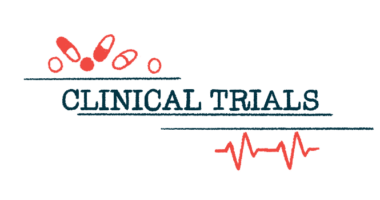1st patient dosed in Phase 1 trial of triple-target treatment ISB 2001
Therapy designed to kill cancer cells in patients with hard-to-treat myeloma

The first multiple myeloma patient has been dosed in a Phase 1 clinical trial evaluating the safety and efficacy of ISB 2001, Ichnos Sciences’ trispecific antibody — a treatment that simultaneously targets three proteins.
This study (NCT05862012) aims to recruit up to 80 adults with relapsed or refractory (hard-to-treat) multiple myeloma at sites in Australia and the U.S. Locations in the U.S. may not yet be open.
Eligible patients for this first-in-human study must have failed to respond or have relapsed after previous treatment with immunomodulatory medications, proteasome inhibitors, and anti-CD38 antibodies.
“Our novel approach to targeting multiple molecules intends to enhance specificity, engage the immune system, and offer potential synergistic effects in our ongoing pursuit of groundbreaking cancer treatments,” Cyril Konto, MD, Ichnos’ president and CEO, said in a company press release. Synergy occurs when the combined effects of two or more factors are greater than the sum of each factor’s effects.
The trial was cleared to start by regulatory agencies in both the U.S. and Australia.
How the therapy works to launch a cancer-destroying attack
ISB 2001 is a triple-target antibody, meaning the therapy has three arms — each one reaching out and interacting with a different target. Those targets are CD38, BCMA, and CD3.
CD38 and BCMA are proteins highly present at the surface of myeloma cells, while CD3 is a cell surface molecule found in T-cells, a type of immune cell with cancer-killing abilities.
By simultaneously targeting two cancer-specific proteins and a T-cell protein, the treatment candidate is expected to effectively redirect immune cells to CD38- and/or BCMA-positive myeloma cells, triggering a cancer-destroying attack.
“By targeting two tumor-associated [proteins], ISB 2001 exhibits heightened specificity in recognizing and binding to tumor cells,” Ichnos said.
According to data presented earlier this year, this triple-threat approach has resulted in the therapy’s increased ability to kill myeloma cells in lab tests relative to other bispecific antibodies in development. The treatment also was found superior in this respect to a combination of Darzalex (daratumumab) and teclistamab that’s under clinical testing for hard-to-treat myeloma.
Darzalex is an anti-CD38 antibody, while teclistamab is a bispecific antibody targeting both CD3 and BCMA.
ISB 2001 was granted orphan drug status in the U.S. earlier this year for the treatment of multiple myeloma. That designation comes with certain benefits that aim to accelerate the therapy’s development, such as tax credits and exclusive right to market the medication for seven years, should it be approved.
2-part trial to test treatment’s safety up to 18 months in myeloma patients
The ongoing Phase 1 trial has two parts. The first involves dose escalation, in which participants will receive ISB 2001 weekly for 28-day cycles.
An additional step-up dose will be administered on day 4 of the first cycle. Dosing will be increased until the maximum tolerated or planned dose, or until a suitable dose is selected for Phase 2 testing.
In the second dose-expansion part, a greater number of patients will receive ISB 2001 at each potential recommended dose until their disease gets worse, they experience unacceptable toxic effects, treatment needs to be stopped for any reason, or they decide to leave the study.
We look forward to advancing our understanding of [ISB 2001’s] safety and efficacy profile as we progress through this first-in-human study.
One of the trial’s main goals is to see how safe ISB 2001 is when given for up to 18 months, or about 1.5 years, based on the frequency and severity of adverse events. The number of dose-limiting toxicity events participants experience during the four weeks after their first dose also will be recorded.
Secondary measures include overall response rate — the proportion of patients who respond to treatment — and complete response rate, or the proportion of patients who show no signs of cancer after treatment. Duration of response and survival measures at 18 months will be noted as well.
“We look forward to advancing our understanding of [ISB 2001’s] safety and efficacy profile as we progress through this first-in-human study,” said Lida Pacaud, MD, chief medical officer at Ichnos.
In addition, the study will look at the pharmacokinetics of ISB 2001, which refers to how the medication moves into, through, and out of the body. This will be done by measuring medication levels in the blood and the time it takes to reach its maximum. The development of neutralizing antibodies against the therapy also will be assessed.
Ichnos is developing other medications for multiple myeloma. Its lead candidate, ISB 1342, an antibody that targets both CD38 and CD3, is being evaluated in a Phase 1 trial (NCT03309111).
ISB 1442, a dual-target antibody directed against CD38 and CD47 — another protein found on myeloma cells — also received orphan drug status in the U.S. earlier this year. It is now in testing in a Phase 1/2 study (NCT05427812).
“We are proud to advance our third oncology asset to clinical trials — a milestone made more significant because it is our first clinical-stage trispecific [triple-target] antibody,” Konto said.







